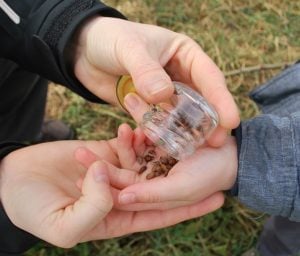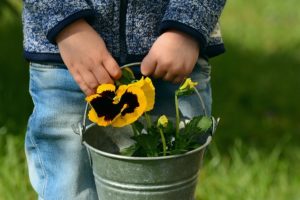 Spring is a time of new beginnings and longer days in the sun. Heading outside with your kids to take advantage of the beautiful weather is an excellent way to get some vitamin D, let your little ones expend pent-up energy, and enjoy quality time together.
Spring is a time of new beginnings and longer days in the sun. Heading outside with your kids to take advantage of the beautiful weather is an excellent way to get some vitamin D, let your little ones expend pent-up energy, and enjoy quality time together.
One productive way to spend time outdoors is to plant a spring garden. Not only will a vegetable garden give you fresh produce for little cost, but it also will teach your children about the world around them. Whether you want to explore science, math, language arts, or practical life skills, you can use your spring garden as an educational tool in hundreds of ways.
Science
You will not be disappointed if you are looking for ways to incorporate scientific exploration into your gardening adventures. There are scientific concepts at work everywhere, and the garden is no exception. Use some of these ideas to spark your little scientist’s interest and watch where their curiosity leads them; you may even learn something yourself.
* Discuss the life cycle of plants with your child and then watch the process in real time in your garden.
* Talk about photosynthesis in an age-appropriate manner; this fascinating process will pique the interest of people of all ages.
* Experiment using different fertilizers and pesticides on your plants and record their reactions. Discuss the results later to determine the best products for your next garden.
* Research the topic and make your own compost bin. Learn and talk about why and how a compost bin works. Use the compost in your garden when it is ready.
Math
Math does not have to be a dull or maddening experience. When students apply their mathematical lessons to real-life situations, they can better grasp concepts that seem foreign when viewed only in a textbook. Ditch the math book for a while and head outside for a hands-on mathematical experience in the garden.
 * Teach or practice measuring and graphs by tracking the growth of your plants.
* Teach or practice measuring and graphs by tracking the growth of your plants.
* Practice division by having your child evenly split a packet of seeds based on how many you wish to plant per hole. You can then have them determine the number of holes to dig.
* Very young gardeners can practice counting seeds as they get planted.
* If you will be building a raised bed, have your little mathematicians test their geometry know-how. Allow them to draw up a blueprint; make sure all measurements are correct, and corners are square. This is a fairly complex task, so be available to help them find answers if needed.
Language arts
There are several easy ways to incorporate language arts into your gardening experience.
* Have your child write about the gardening process, giving step-by-step instructions on how to plant and raise a garden successfully.
* Beginning readers can practice their reading skills by telling you the names on seed packets.
* Intermediate readers can practice reading by following instructions for planting, which onecan find online and print out.
* Creative writing can be tied in by asking your child to write a poem about their favorite plant in the garden.
Life skills
 Life skills are as important to learn as the three R’s. The ability to sew, cook, drive, and wash laundry are all beneficial skills to have. Gardening also helps children in their daily lives in many ways.
Life skills are as important to learn as the three R’s. The ability to sew, cook, drive, and wash laundry are all beneficial skills to have. Gardening also helps children in their daily lives in many ways.
* Planting and caring for living plants will help your kids develop a sense of responsibility and good work ethic.
* The ability to grow their own food boosts self-confidence while providing a helpful skill.
* Waiting for plants to sprout and be ready to harvest teaches patience, and the reward reinforces the idea of deferred gratification.
* Growing and eating your own fruits and vegetables provides many great opportunities for discussing nutrition and healthful eating.
These are just a few of the many ways you can use your springtime gardening as a time of intentional learning. Think outside the box and see what other ideas you can come up with, and whatever you do, remember to have fun!
.
.
Edublox offers cognitive training and live online tutoring to students with dyslexia, dysgraphia, dyscalculia, and other learning disabilities. Our students are in the United States, Canada, Australia, and elsewhere. Book a free consultation to discuss your child’s learning needs.
.
.



